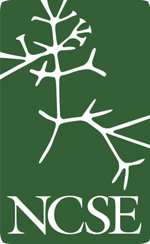
Two members of NCSE's staff, education project director Louise S. Mead and executive director Eugenie C. Scott, recently surfaced in the blogosphere — Mead with a guest post on the blog of the National Association of Biology Teachers, and Scott in a question-and-answer session on the La Ciencia y sus Demonios (Science and its Demons) blog.
In her post (February 18, 2010), Mead gently chided the recent Becoming Human series for its implicit comparison of modern chimpanzees and humans, which "fuels the misconception that humans evolved from 'monkeys'." "Don't get me wrong," Mead explained, "I love NOVA." But "numerous times statements like '[m]illions of years ago, we were apes, living ape lives in Africa' are paired with video segments of modern day chimpanzees and gorillas, which unfortunately promotes the misconception that we evolved from modern day chimpanzees, or even monkeys, since I'm guessing many people do not readily distinguish between chimps and monkeys." Mead acknowledged, "By the end of the three part program, however, I was less stressed over the perpetuation of the chimp to human comparison, and more excited by some of the newer findings presented in the series," and she recommended the resources for teachers provided at NOVA's evolution website.
In her interview (February 18, 2010), Scott discussed a wide variety of topics on evolution, creationism, and science education. Among the highlights was her answer to a question about the best way to counter creationism. "In the long run," she answered, "the best way to combat creationism or any other erroneous scientific idea is to have better trained teachers who understand science and who understand why evolution is critically important to biology, geology, and astronomy. In the US, we need to do a better job of recruiting the smartest and most enthusiastic students to go into education as a career, which will require making the education field more attractive, both in pay as well as in working conditions. Once good students are recruited, we need to do a better job of preparing them for the classroom. This will involve improving their understanding of science as a way of knowing (philosophy of science) and also their understanding of basic science and mathematics."
